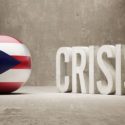Puerto Rico has suffered the effects of two hurricanes this month. In Puerto Rico between 1953 and 2011 there were 11 hurricanes, 9 severe storms, 8 floods, 2 droughts, one fire, and one unidentified “other” disaster — 32 disasters.
Between 2005 and 2016, FEMA provided $392,000,000 in grants to Puerto Rico to cope with disasters. Connecticut, with a population just a little bit larger than Puerto Rico, declared 31 disasters between 1953 and 2011, a number very close to Puerto Rico’s. Yet, even though Connecticut has similar numbers for population and a similar frequency of disasters, Connecticut received $698,000,000 from FEMA between 2005 and 2016.
What’s the difference? Puerto Rico is a territory. Connecticut is a state.
Connecticut has 5 seats in the House of Representatives and 2 senators. Puerto Rico has one non-voting representative.
Is it only Connecticut? Iowa has a population of a little more than 3 million, and received $2,539,000,000 in grants from FEMA between 2005 and 2016. Oklahoma, with a population of just over 3.8 million, received $1,254,000,000.
There are many factors involved in grants awarded to various areas, certainly including the level of destruction and the level of need. Grants are not awarded according to the population of the state or territory.
Speaker of the House Paul Ryan recently said, “The stories and images coming out of Puerto Rico are devastating. Congress is working with the administration to ensure necessary resources get to the U.S. territory. Our fellow citizens in Puerto Rico remain in our prayers as we make sure they have what they need.”
Rep. Rob Bishop, Chairman of the House Committee on Natural Resources, said, “The residents of the U.S. Virgin Islands and Puerto Rico have been devastated by Hurricane Maria, a storm that took human lives and left millions without power, water and stable infrastructure. This is the most unfortunate circumstances that both of these U.S. territories could possibly face given the recent devastation of Hurricane Irma. I, along with all of our committee members, pray for all those impacted.
“I have spoken with Resident Commissioner Gonzalez on the extent of the damage, as well as plans for relief, and will be working with Delegate Plaskett on a similar plan of action. Together, we will advocate for the full support of the federal government. Both Puerto Rico and the U.S. Virgin Islands are in dire need of our assistance and we will do everything in our power to ensure that all necessary resources are made available.
“As Americans, both in the mainland and throughout all of our territories, we are all in this together.”
Yet there is a difference between emergency support in the states and in the territories. States have multiple voting representatives in the legislature. Puerto Rico, as a territory, is in a weaker position than the states.
Governor Rossello of Puerto Rico and the island territory’s non-voting member of Congress, Jenniffer Gonzalez-Colon, have been working closely and in a spirit of mutual cooperation with FEMA to mobilize resources for relief and recovery. There is no lack of effort and commitment at the federal or local level to ensure residents in Puerto Rico are treated as much like residents of a state as possible.
The extent of damage and humanitarian crisis caused by Hurricane Maria in Puerto Rico may be so severe that federal support for recovery will reach state-like levels in this case. But Puerto Rico will continue to face hurricanes, and its people are U.S. citizens. So a state-like federal and local response to this and future disasters will be sustainable only when Puerto Rico becomes a state and is able to prepare for and recover from natural disasters like the other 50 states.








No responses yet